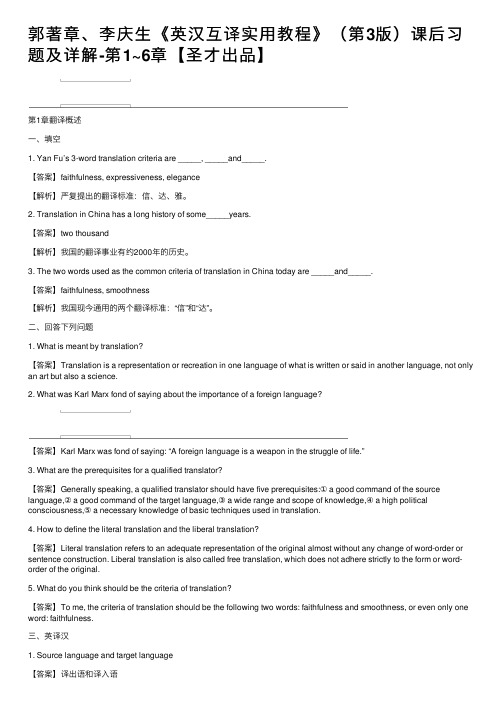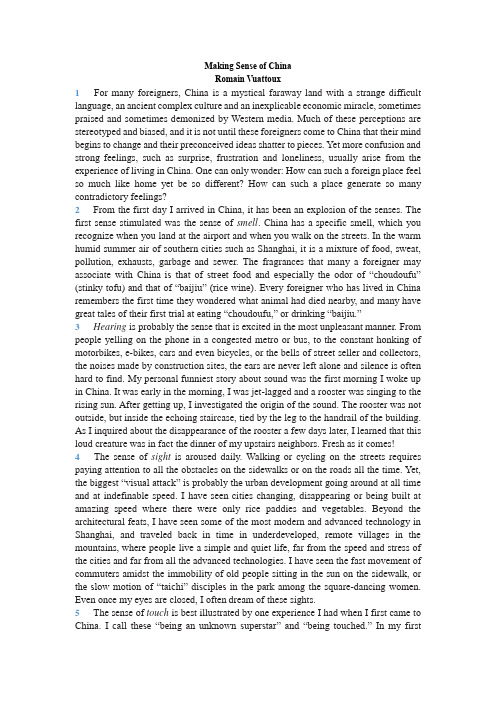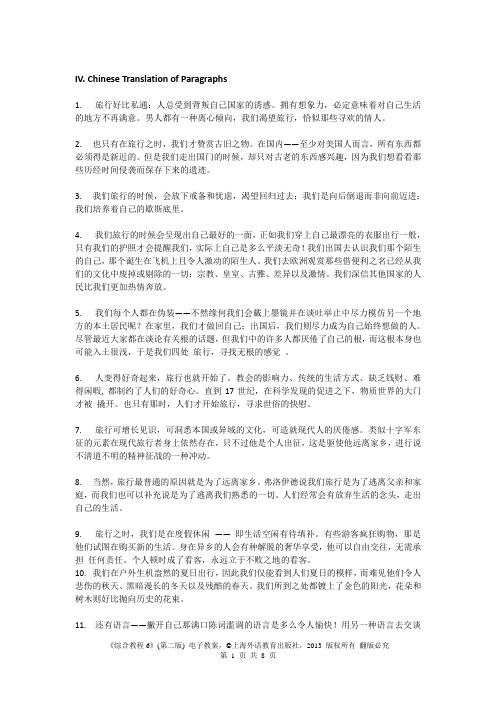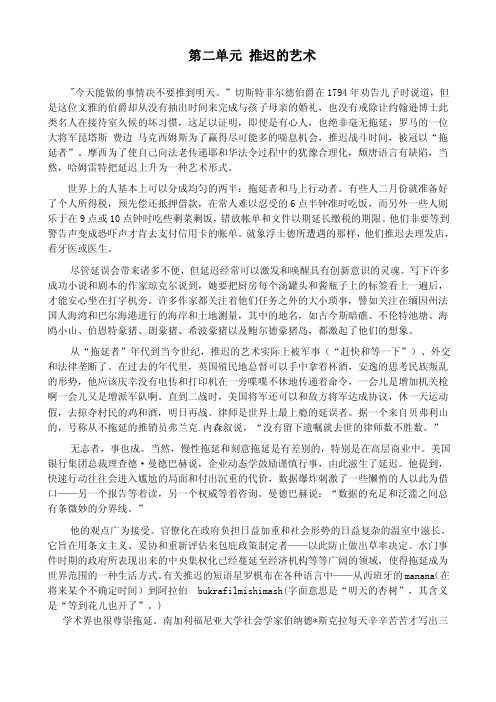翻译教程第六次课
自考日语教程课文翻译与练习包括

第一课私は日本人です课文译文我是日本人〔一〕这是桌子。
那是笔记本。
那是书。
这是什么?那是报纸。
那是什么?这是词典。
那是什么?那是铅笔。
〔二〕小王,你是中国人吗?是的,我是中国人。
田中也是中国人吗?不,田中不是中国人,是日本人。
你是日本人吗?对,我是日本人。
佐藤也是日本人吗对,是的。
练习答案一、①D②C③B④A二、①B②B③B④ C三、①D②B③B④ C四、1.これは新闻です。
2.それは辞书ではありません。
3.王さんは中国人です。
4.私は日本人ではありません。
第二课ここは教室です课文译文这里是教室〔一〕这里是教室。
那里是图书馆。
那里是食堂。
学校的前面是百货商店,对吗?不,学校的前面是一家公司。
是什么公司?是家电脑公司。
那里以前是百货商店吗?不,那里以前不是百货商店。
百货商店在哪里?百货商店在学校的后面。
〔二〕山下:各位,早上好。
我是山下。
请多多照顾。
小赵:初次见面。
我是中国人,我姓赵。
是东京大学的留学生。
专业是日语。
请多多照顾。
练习答案一、1.C2.D3.A4.B二、1.B2.D3.B4.C三、1.A2.B3.B4.B四、1.①それは田中さんの本です。
② これはわたしの铅笔です。
③ あれは新闻です。
④ 先生の机はそれです。
⑤ 佐藤さんは日本人です。
2.①いいえ、わたしは田中さんではありません。
② はい、わたしは张です。
③ いいえ、王さんの新闻はそれではありません。
④ はい、あの日本人は留学生です。
3.①いいえ、これはノートではありません。
本です。
② いいえ、このノートは王さんのではありません。
佐藤さんのです。
③ いいえ、わたしは中国人ではありません。
日本人です。
④ いいえ、わたしは田中さんではありません。
山下です。
五、1.この机は山下のです。
2.これは新闻です。
本ではありません。
3.わたしはもと学生でした。
4.デパートは図书馆の後ろです。
第三课春は暖かいです课文译文春天暖和〔一〕春天暖和。
夏天炎热。
新编英语教程6课文翻译

第1单元避免两词铭记两词在生活中,没有什么比顿悟更令人激动,更有益处了,它可以改变一个人,不仅仅是改变,而且变得更好,当然这种顿悟的时刻很罕见,但仍然会降临到我们所有人身上,它有时来自于一本书,一次不到一句诗歌,有时来自于一个朋友,在曼哈顿一个寒冷的冬季下午,我坐在一个法国小餐馆儿里,倍感失落和压抑,因为我的几次错误估算,一个对我人生至关重要的项目落空了,就连马上要见到一个老朋友(这个老人,我常私下亲切的这样想到他)的念头,都不像以前那样让我兴奋,我坐在桌边,皱起眉头看着色彩多样的桌布,反复咀嚼着自己的失误。
他来了,穿过街道,裹着旧大衣,不成形的毡帽低低的压在光头上,看上去不像是一个有名的精神病医生,倒像是一个精力充沛的小土地神,他的几个办公室就在附近,我知道他看完今天的最后一个病人,他年近80,但仍然拎着装满文件的公文包,工作起来像一个大机构的主管,只要有空,他仍然爱溜去打高尔夫球。
他敏锐的观察力早已不让我感到惊奇,于是我就详细的把烦恼告诉了他,带着一丝忧伤的自豪,我尽量的陈述实情,对自己的失意,我只能怪自己,不怪任何人,我分析了整件事情,所有的错误判断,以及不明智的行动,我讲了约有15分钟,老人默默的喝着啤酒。
老人从纸盒里拿出一盒磁带,放进录音机,然后说,磁带上有到我这里来求助的三个人的简短录音,当然我不告诉你是谁,我想让你听听,看你是否能找出,一个两字短语,是三个案例所共有的。
他笑道,别这么困惑,我有我的理由。
在我看来,磁带上三个人所共有的不是愉快的事,首先讲话的是个男人,他显然做生意遭受了一些损失,或经历了失败,他怪自己工作不够努力,没有远见,第二个说话的是个女人,他一直未婚,因为他要对自己的寡母尽孝心,他痛苦的回忆了被自己放弃的所有嫁人的机会,第三个说话的是位母亲,她十多岁的儿子被警察抓了,她不停的责备自己。
老人关掉录音机,靠在椅子上:“这些录音中有一个充满微妙毒性的短语,反复出现了六次,你听出来了吗?没有,噢,这可能是因为几分钟前在餐馆里,你自己说了三次。
商务英语阅读课文翻译第六课

第六课主课文译文魁北克贸易高峰会带给欧洲的教训亚伦·卢卡斯最近,我刚刚结束了魁北克五日之行,那是一座位于圣劳伦斯河畔古色古香、风景如画的小镇,今后,它将以―世界催泪瓦斯之都‖载入史册。
我此行的目的是为了打入反全球化、反自由贸易运动的头脑人物内部,但问题是,那里根本没有―头脑‖可寻。
我所看到的只是心绪的漫天宣泄,我面前是一派悲天悯人的景象。
显而易见,这里的稀缺之物是清醒的思考。
我来魁北克有个堂而皇之的理由,那便是采访美洲高峰会,这是一次跨越西半球三十四位国家首脑的聚会,会议最重要的议题是通过谈判,努力建立起美洲自由贸易区–一个地域跨越阿拉斯加至阿根廷的无贸易壁垒区域。
其实,我来魁北克是为了―人民的峰会‖,那才是真正的亮点。
这一应运而生、有组织的活动看起来是要反映―人民的观点‖,还会是别的吗?(我曾想,那些参加峰会、经选举产生的领导人是为此目的而来,但我有什么资格向―那些人民‖提出质疑呢?)半球社会联盟由不同的社会团体组成,他们有着共同的思想意识和经济利益,他们共同反对贸易自由化。
该联盟这次邀请参加―反资本主义狂欢节‖的都是激进团体,从极左到更极左,―狂欢节‖在沿河畔搭建的硕大白色帐篷内举行。
加拿大政府好事做过了头,不仅资助了这项活动(其实是加拿大纳税人提供的资助),而且还为拉丁美洲的激进分子付费参加活动。
―反资本主义狂欢节‖丝毫无愧于它的名称,有小丑、木偶表演、拉拉队长的呐喊、舞者和演员的表演,还有―愤怒的奶奶们‖(一群不算太老辱骂大公司的妇女),甚至还有一个悬在空中、上面写着―实施安全贸易!‖的巨大绿色安全套。
或许我最喜欢的是那些身着蓝色服装、面对由纸浆制成的女水神像歌唱并参拜的演员们。
除了此道风景,别无其他实质性内容,无论是在街面上,还是在各类有组织的―讲道论坛‖中,情况均如此。
看一看下面的对话,这是我同一个保养得极好的年轻激进分子之间的谈话(当然喽,此人穿的是进口的牛崽裤和运动鞋)。
21世纪大学实用英语综合教程(第一册)5-6-7课文及其翻译

第五课The Treasure in the OrchardAn old gardener who was dying sent for his two sons to come to his bedside, as he wished to speak to them. When they came in answer to his request, the old man, raising himself on his pillows, pointed through the window towards his orchard."You see that orchard?" said he."Yes, Father, we see the orchard.""For years it has given the best of fruit - golden oranges, red apples, and cherries bigger and brighter than rubies!""To be sure, Father. It has always been a good orchard!"The old gardener nodded his head, time and time again. He looked at his hands - they were worn from the spade that he had used all his life. Then he looked at the hands of his sons and saw that their nails were polished and their fingers as white as those of any fine lady's."You have never done a day's work in your lives, you two!" said he. " I doubt if you ever will! But I have hidden a treasure in my orchard for you to find. You will never possess it unless you dig it up. It lies midway between two of the trees, not too near, yet not too far from the trunks. It is yours for the trouble of digging - that is all!Then he sent them away, and soon afterwards he died. So the orchard became the property of his sons, and without any delay, they set to work to dig for the treasure that had been promised them.Well, they dug and dug, day after day, week after week, going down the long alleys of fruit trees, never too near yet never too far from the trunks. They dug up all the weeds and picked out all the stones, not because they liked weeding and cleaning, but because it was all part of the hunt for the buried treasure. Winter passed and spring came, and never were there such blossoms as those which hung the orange and apple and cherry trees with curtains of petals pale as pearls and soft as silk. Then summer threw sunshine over the orchard, and sometimes the clouds bathed it in cool, delicious rain. At last the time of the fruit harvest came. But the two brothers had not yet found the treasure that was hidden among the roots of the trees.Then they sent for a merchant from the nearest town to buy the fruit. It hung in great bunches, golden oranges, red apples, and cherries bigger and brighter than rubies. The merchant looked at them in open admiration."This is the finest crop I have yet seen," said he, " I will give you twenty bags of money for it!"Twenty bags of money were more than the two brothers had ever owned in their life. They struck the bargain in great delight and took the money - bags into the house, while the merchant made arrangements to carry away the fruit."I will come again next year," said he, " I am always glad to buy crop like this. How you must have dug and weeded and worked to get it!"He went away, and the brothers sat eyeing each other over the tops of the money-bags. Their hands were rough and toil-worn, just as the old gardener's had been when he died."Golden oranges and red apples and cherries bigger and brighterthan rubies," said one of them, softly." I believe that this is the treasure we have been digging for all year, the very treasure our father meant!"一个老园丁快死了,叫人把两个儿子叫到床边来,因为他想要对他们说话。
郭著章、李庆生《英汉互译实用教程》(第3版)课后习题及详解-第1~6章【圣才出品】

郭著章、李庆⽣《英汉互译实⽤教程》(第3版)课后习题及详解-第1~6章【圣才出品】第1章翻译概述⼀、填空1. Yan Fu’s 3-word translation criteria are _____, _____and_____.【答案】faithfulness, expressiveness, elegance【解析】严复提出的翻译标准:信、达、雅。
2. Translation in China has a long history of some_____years.【答案】two thousand【解析】我国的翻译事业有约2000年的历史。
3. The two words used as the common criteria of translation in China today are _____and_____.【答案】faithfulness, smoothness【解析】我国现今通⽤的两个翻译标准:“信”和“达”。
⼆、回答下列问题1. What is meant by translation?【答案】Translation is a representation or recreation in one language of what is written or said in another language, not only an art but also a science.2. What was Karl Marx fond of saying about the importance of a foreign language?【答案】Karl Marx was fond of saying: “A foreign language is a weapon in the struggle of life.”3. What are the prerequisites for a qualified translator?【答案】Generally speaking, a qualified translator should have five prerequisites:① a good command of the source language,② a good command of the target language,③ a wide range and scope of knowledge,④ a high political consciousness,⑤ a necessary knowledge of basic techniques used in translation.4. How to define the literal translation and the liberal translation?【答案】Literal translation refers to an adequate representation of the original almost without any change of word-order or sentence construction. Liberal translation is also called free translation, which does not adhere strictly to the form or word-order of the original.5. What do you think should be the criteria of translation?【答案】To me, the criteria of translation should be the following two words: faithfulness and smoothness, or even only one word: faithfulness.三、英译汉1. Source language and target language【答案】译出语和译⼊语2. the Oriental and Occidental languages 【答案】东⽅语⾔和西⽅语⾔3. Alexander Fraser Tyler【答案】亚历⼭⼤?弗雷泽?泰勒4. Georges Mounin【答案】乔治?穆南5. Feedorov【答案】费道罗夫6. Indu Dharmarakcha【答案】竺法护7. Kumara’3iva【答案】鸠摩罗什8. Paramartha(Gunarata)【答案】真谛/波罗末陀(拘那罗陀)【答案】利玛窦10. Euclid’s Elements【答案】《⼏何原本》11. La Dame aux Camelias【答案】《茶花⼥》12. A History of Politics(by E. Jenks)【答案】《社会通诠》(甄克思著)13. On Liberty(by J. S. Mill)【答案】《群⼰权界论》(约翰?穆勒著)14. An Inquiry Into the Nature and Cause of the Wealth of Nations(by A.Smith) 【答案】原富》(亚当?斯密)15. Evolution and Ethics and Other Essays(by T. H. Huxley)【答案】《天演论》(赫胥黎)四、汉译英【答案】faithfulness, expressiveness and elegance2. “宁顺⽽不信。
大学跨文化英语 综合教程I Unit 6 Making Sense of China课文翻译

Making Sense of ChinaRomain Vuattoux1 For many foreigners, China is a mystical faraway land with a strange difficult language, an ancient complex culture and an inexplicable economic miracle, sometimes praised and sometimes demonized by Western media.Much of these perceptions are stereotyped and biased, and it is not until these foreigners come to China that their mind begins to change and their preconceived ideas shatter to pieces. Yet more confusion and strong feelings, such as surprise, frustration and loneliness, usually arise from the experience of living in China. One can only wonder: How can such a foreign place feel so much like home yet be so diff erent? How can such a place generate so many contradictory feelings?2 From the first day I arrived in China, it has been an explosion of the senses. The first sense stimulated was the sense of smell. China has a specific smell, which you recognize when you land at the airport and when you walk on the streets. In the warm humid summer air of southern cities such as Shanghai, it is a mixture of food, sweat, pollution, exhausts, garbage and sewer. The fragrances that many a foreigner may associate with China is that of street food and especially the odor of “choudoufu” (stinky tofu)and that of “baijiu” (rice wine). Every foreigner who has lived in China remembers the first time they wondered what animal had died nearby, and many have great tales of their fi rst trial at eating “choudoufu,” or drinking“baijiu.”3 Hearing is probably the sense that is excited in the most unpleasant manner. From people yelling on the phone in a congested metro or bus, to the constant honking of motorbikes, e-bikes, cars and even bicycles, or the bells of street seller and collectors, the noises made by construction sites,the ears are never left alone and silence is often hard to find. My personal funniest story about sound was the first morning I woke up in China. It was early in the morning, I was jet-lagged and a rooster was singing to the rising sun. After getting up, I investigated the origin of the sound. The rooster was not outside, but inside the echoing staircase, tied by the leg to the handrail of the building. As I inquired about the disappearance of the rooster a few days later, I learned that this loud creature was in fact the dinner of my upstairs neighbors. Fresh as it comes!4 The sense of sight is aroused daily. Walking or cycling on the streets requires paying attention to all the obstacles on the sidewalks or on the roads all the time. Yet, the bigge st “visual attack” is probably the urban development going around at all time and at indefinable speed. I have seen cities changing, disappearing or being built at amazing speed where there were only rice paddies and vegetables. Beyond the architectural feats, I have seen some of the most modern and advanced technology in Shanghai, and traveled back in time in underdeveloped, remote villages in the mountains,where people live a simple and quiet life, far from the speed and stress of the cities and far from all the advanced technologies. I have seen the fast movement of commuters amidst the immobility of old people sitting in the sun on the sidewalk, or the slow motion of “taichi” disciples in the park among the square-dancing women. Even once my eyes are closed, I often dream of these sights.5 The sense of touch is best illustrated by one experience I had when I first came to China. I call these “being an unknown superstar” and “being touched.” In my f irsteducational establishment, I sometimes had to teach in another campus on the other side of town. I would ride my bicycle across town to get to class, and it often felt like being in a movie. All the kids and adults stared and pointed to the “laowai” (foreigner) on his bicycle. As I took an excursion in the “deep” countryside, many people would approach me while I was buying some water or some snack and would start touching the hair on my arms.6 For foreigners as for Chinese, the most important sense is the sense of taste. It is also certainly the one that provides the most pleasure and the base of many relationships.I have been invited to many meals and took part in ceremonial drinking. I have seen food displays that are as elaborate as their tastes. Thousand-year-old eggs, snake, turtle, dumplings, bamboo,lotus root, pigs ears, lacquered ducks, duck neck and head, chicken feet,spicy fish head, the hundreds of ways of eating tofu are just some of the dishes that one discovers and appreciates. A lifetime would never suffice to try to taste all the specialties in China.7 Orderly chaos, disorganized order, old and new, beautiful and filthy,clean and dirty, rich and poor, kindness and arrogance ... All are opposed sensations and situations living together, side by side. For me, China is a collision of feelings, a juxtaposition of experiences and perceptions that are usually contradictory. China is all these contradictions and diversity that somehow manage to live together almost harmoniously.参考译文解读中国罗曼·瓦图对于很多外国人而言,中国是一个遥远而神秘的国度,有着奇特难懂的语言,古老深奥的文化,以及难以解释的经济奇迹,时而被西方媒体戴高帽,时而被他们妖魔化。
(完整版)英专综合教程6册课文翻译及课后答案Answertounit6

IV. Chinese Translation of Paragraphs1. 旅行好比私通:人总受到背叛自己国家的诱惑。
拥有想象力,必定意味着对自己生活的地方不再满意。
男人都有一种离心倾向,我们渴望旅行,恰似那些寻欢的情人。
2. 也只有在旅行之时,我们才赞赏古旧之物。
在国内——至少对美国人而言,所有东西都必须得是新近的。
但是我们走出国门的时候,却只对古老的东西感兴趣,因为我们想看看那些历经时间侵袭而保存下来的遗迹。
3. 我们旅行的时候,会放下戒备和忧虑,渴望回归过去;我们是向后倒退而非向前迈进;我们培养着自己的歇斯底里。
4. 我们旅行的时候会呈现出自己最好的一面,正如我们穿上自己最漂亮的衣服出行一般,只有我们的护照才会提醒我们,实际上自己是多么平淡无奇!我们出国去认识我们那个陌生的自己,那个诞生在飞机上且令人激动的陌生人。
我们去欧洲观赏那些借便利之名已经从我们的文化中废掉或剔除的一切:宗教、皇室、古雅、差异以及激情。
我们深信其他国家的人民比我们更加热情奔放。
5. 我们每个人都在伪装——不然缘何我们会戴上墨镜并在谈吐举止中尽力模仿另一个地方的本土居民呢?在家里,我们才做回自己;出国后,我们则尽力成为自己始终想做的人。
尽管最近大家都在谈论有关根的话题,但我们中的许多人都厌倦了自己的根,而这根本身也可能入土很浅,于是我们四处旅行,寻找无根的感觉。
6. 人变得好奇起来,旅行也就开始了。
教会的影响力、传统的生活方式、缺乏钱财、难得闲暇, 都制约了人们的好奇心。
直到17世纪,在科学发现的促进之下,物质世界的大门才被撬开。
也只有那时,人们才开始旅行,寻求世俗的快慰。
7. 旅行可增长见识,可洞悉本国或异域的文化,可造就现代人的厌倦感。
类似十字军东征的元素在现代旅行者身上依然存在,只不过他是个人出征,这是驱使他远离家乡,进行说不清道不明的精神征战的一种冲动。
8. 当然,旅行最普通的原因就是为了远离家乡。
弗洛伊德说我们旅行是为了逃离父亲和家庭,而我们也可以补充说是为了逃离我们熟悉的一切。
新编英语教程6课文翻译

第二单元推迟的艺术"今天能做的事情决不要推到明天。
”切斯特菲尔德伯爵在1794年劝告儿子时说道,但是这位文雅的伯爵却从没有抽出时间来完成与孩子母亲的婚礼,也没有戒除让约翰逊博士此类名人在接待室久候的坏习惯,这足以证明,即使是有心人,也绝非毫无拖延,罗马的一位大将军昆塔斯费边马克西姆斯为了赢得尽可能多的喘息机会,推迟战斗时间,被冠以“拖延者”。
摩西为了使自己向法老传递耶和华法令过程中的犹豫合理化,颓唐语言有缺陷,当然,哈姆雷特把延迟上升为一种艺术形式。
世界上的人基本上可以分成均匀的两半:拖延者和马上行动者。
有些人二月份就准备好了个人所得税,预先偿还抵押借款,在常人难以忍受的6点半钟准时吃饭,而另外一些人则乐于在9点或10点钟时吃些剩菜剩饭,错放帐单和文件以期延长缴税的期限。
他们非要等到警告声变成恐吓声才肯去支付信用卡的帐单。
就象浮士德所遭遇的那样,他们推迟去理发店,看牙医或医生。
尽管延误会带来诸多不便,但延迟经常可以激发和唤醒具有创新意识的灵魂。
写下许多成功小说和剧本的作家琼克尔说到,她要把厨房每个汤罐头和酱瓶子上的标签看上一遍后,才能安心坐在打字机旁。
许多作家都关注着他们任务之外的大小琐事,譬如关注在缅因州法国人海湾和巴尔海港进行的海岸和土地测量,其中的地名,如古今斯暗礁、不伦特池塘、海鸥小山、伯恩特豪猪、朗豪猪、希波豪猪以及鲍尔德豪猪岛,都激起了他们的想象。
从“拖延者”年代到当今世纪,推迟的艺术实际上被军事(“赶快和等一下”)、外交和法律垄断了。
在过去的年代里,英国殖民地总督可以手中拿着杯酒,安逸的思考民族叛乱的形势,他应该庆幸没有电传和打印机在一旁喋喋不休地传递着命令,一会儿是增加机关枪啊一会儿又是增派军队啊。
直到二战时,美国将军还可以和敌方将军达成协议,休一天运动假,去掠夺村民的鸡和酒,明日再战。
律师是世界上最上瘾的延误者。
据一个来自贝弗利山的,号称从不拖延的推销员弗兰克.内森叙说,“没有留下遗嘱就去世的律师数不胜数。
- 1、下载文档前请自行甄别文档内容的完整性,平台不提供额外的编辑、内容补充、找答案等附加服务。
- 2、"仅部分预览"的文档,不可在线预览部分如存在完整性等问题,可反馈申请退款(可完整预览的文档不适用该条件!)。
- 3、如文档侵犯您的权益,请联系客服反馈,我们会尽快为您处理(人工客服工作时间:9:00-18:30)。
Lecture SixTranslation of Words (II)Section 2 The choice of English appropriate wordsAfter analysing the meaning of the source language----Chinese, the translator has to decide what expressions he should use in the target language---- English. In the second stage, the translator has to pay attention of the following aspects.1. Choosing Words according to Collocation学习知识to acquire (gain) knowledge学习雷锋take Lei Feng as a model (an example). Learn freom Lei Feng.学数学study mathematics学文化learn to read and write.当然我们也要学习世界上一切先进的经验,世界各国,包括美国在内,有先进的东西我们也要学。
Of course, we should also learn from all the advanced experience of all the other countries in the world, including the United States♦这菜真香。
How delicious the dish is.♦这花儿真香。
How fragrant (sweet) the flowers are.♦新犁过的土地散发着芳香。
The newly ploughed fields smelt sweet.♦空气中有熏衣草和迷迭香花的味道。
♦There is a lavender scent and rosemary scent in the air.♦我的乖乖香。
You are sweet (lovely) baby. What a sweet (lovely) child you are.对灾区人民表示慰问。
To express sympathy and solicitude for the people of disaster areas.请向他们表示亲切慰问。
Please convey to them our sincere solicitude.慰问团 a group sent to convey greeting;慰问演出 a special performance as an expression of gratitude or appreciation.Choosing Words according to Collocation我们应该推行强硬政策。
We should carry out a strong policy.应改为:We should carry out a tough policy.热烈祝贺亚运会。
Warmly congratulate the Asian Games.应改为:Hail / Greet the Asian Games.欢迎你来和我们一道工作。
Welcome you to work with us.应改为:You are welcome to work with us.她嫁给了一个老外。
She married with/to a foreigner.应改为:She married a foreigner.♦美国和英国开始认识到:只有中国战场的胜利才能遏止德、意、日“轴心国”的联盟。
♦The United States and Britain began to see that only victory on the Chinese battlefield counld contain the Axis alliance of Germany, Italy a nd Japan.♦我最终认识到这件事为何非做不可。
♦I came to realize in the end why it must be done.♦看来她还未认识到有危险。
♦It seems that she is still not aware of the danger.♦恐慌平息了。
Panic subsides.♦立即采取有效措施。
To take immediate and effective measures.驳回上诉。
To reject an appeal法官驳回了诉讼。
The judge dismissed the action.♦没有医疗条件。
Without health services.♦暂停营业to suspend the service.会议取消了.The meeting is cancelled (called off).取消他的会员资格.We will deprive him of his membership.取消禁令To lift a ban取消诺言To kill the promise.2. Never Neglect the Prepositions in Verb Phrases♦无论什么事情都逃不了他的眼睛。
♦Nothing can escape his eyes.♦Explain: We may translate this sentence: Nothing can escape from his eyes.♦有人敲门。
♦Someone is knocking at the door.♦学生正忙着准备大考。
♦The students are busy preparing for the final examination.♦开始他们都把他当成了外国人。
♦At first they took him for a foreigner.♦以便使国家在上帝的福佑下得到自由的新生,并且使这个民有、民治、民享的政府永世长存♦...that this nation, under God, shall have a new birth of freedom—and that government of the people, by the people, for the people, shall not perish from the earth. (From Abraham Lincoln, Gettysburg Address)3. Pay Attention to the Mood♦我们在改革开放中,不能忘记这些基本原则。
♦These basic principles must be kept in mind in our reform and opening to the outside world.♦我们难道能忘记这一惨痛教训吗?♦Can we ever forget this bitter lesson at all?♦俗话说,“男儿有泪不轻弹,皆因未到伤心处”嘛。
♦译文1:As the saying goes, “Men only shed tears when (they are) deeply hurt.”♦译文2:As the saying goes, “Men never shed tears unless they are deeply hurt.”♦当心油漆未干!♦Beware of wet paint!4. Choosing Words according to Style♦姜出而赋:“大遂之外,其乐也泄泄。
”♦When his mother came out, she sang: “This great tunnel, outside/without,♦The joy flies about.”♦忽见东府几个人,慌慌张张跑来,说:“老爷宾天了!”众人听了,吓了一跳。
忙都说:“好好的并无疾病,怎么就没了!”♦… when some servants from the Eastern Mansion came rushing up frantically. “The old master’s dead/ ascended to Heaven!”they announced.♦Everybody was consternated.♦“He wasn’t even ill, how could he die/ pass away so suddenly?”they exclaimed.♦如蒙早日寄来样品或产品册,不胜感激。
♦It would be appreciated if samples and/or brochure could be soon forwarded to us.♦4.直起身又看看豆,自己摇摇头说:“不多不多!多乎哉?不多也。
”(鲁迅《孔乙己》)♦Then straightening up to look at the peas again, he would shake his head. “Not much!V erily, not much, forsooth!”(杨宪益、戴乃迭译)5.Extention in Translation of Words♦少先队员省吃俭用,把积蓄的钱捐献给希望工程。
♦The young pioneers live in a simple way to donate their savings to the Hope Project.♦Explain: If we translate “省吃俭用” into “save food and expenses”our understanding would only on the surface of the original Chinese meaning, and it’s also not cope with the English expression habit.♦他和许多青年一样,没考上大学就上了自修大学。
♦Like most other young people, he is attending a college of continuing education after he failed to pass the college entrance examination.♦我们将采用国际贸易中的国际惯例满足你们提出的要求。
